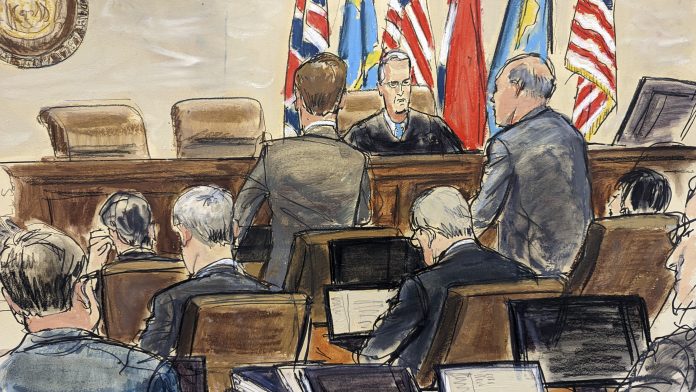
WILMINGTON, Del. (AP) — Fox News agreed Tuesday to pay Dominion Voting Systems nearly $800 million to avert a trial in the voting machine company’s lawsuit that would have exposed how the network promoted lies about the 2020 presidential election.
The stunning settlement emerged just as opening statements were supposed to begin, abruptly ending a case that had embarrassed Fox News over several months and raised the possibility that network founder Rupert Murdoch and stars such as Tucker Carlson and Sean Hannity would have to testify publicly.
“The truth matters. Lies have consequences,” Dominion lawyer Justin Nelson told reporters outside a Delaware courthouse after Superior Court Judge Eric Davis announced the deal.
Outside of the $787.5 million promised to Colorado-based Dominion, it was unclear what other consequences Fox would face. Fox acknowledged in a statement “the court’s rulings finding certain claims about Dominion to be false,” but no apology was offered.
“We are hopeful that our decision to resolve this dispute with Dominion amicably, instead of the acrimony of a divisive trial, allows the country to move forward from these issues,” Fox said. Its lawyers and representatives offered no other comment or details about the settlement.
Asked by a reporter whether there was “anything to this other than money,” Dominion CEO John Poulos did not answer.
The deal is a significant amount of money even for a company the size of Fox. It represents about one-quarter of the $2.96 billion the company reported earning last year before interest, taxes, depreciation and amortization — a figure often used to approximate a company’s cash flow.
The settlement also follows a $965 million judgment issued last year against Alex Jones by a Connecticut jury for spreading false conspiracy theories about the Sandy Hook school massacre.
Coupled with other lawsuits in the pipeline, the agreement shows there is a real financial risk for conservative media that traffic in conspiracy theories. What remains unknown is how much of a deterrent this will be. Even as the Dominion case loomed this spring, Fox’s Tucker Carlson aired his alternate theories about what happened at the Jan. 6, 2021, insurrection.
Dominion had sued Fox for $1.6 billion, arguing that the top-rated news outlet damaged the company’s reputation by peddling phony conspiracy theories that claimed its equipment switched votes from former President Donald Trump to Democrat Joe Biden. Davis, in an earlier ruling, said it was “CRYSTAL clear” that none of the allegations about Dominion aired on Fox by Trump allies were true.
Dominion set out to prove in the lawsuit that Fox acted with malice in airing allegations that it knew to be false, or with “reckless disregard” for the truth. It presented volumes of internal emails and text messages that showed Fox executives and personalities saying they knew the accusations were untrue, even as the falsehoods were aired on programs hosted by Maria Bartiromo, Lou Dobbs and Jeannine Pirro.
Records released as part of the lawsuit showed that Fox aired the claims in part to win back viewers who were fleeing the network after it correctly called hotly contested Arizona for Democrat Joe Biden on election night. One Fox Corp. vice president called them “MIND BLOWINGLY NUTS.”
During a deposition, Murdoch testified that he believed the 2020 election was fair and had not been stolen from Trump.
“Fox knew the truth,” Dominion argued in court papers. “It knew the allegations against Dominion were ‘outlandish’ and ‘crazy’ and ‘ludicrous’ and ‘nuts.’ Yet it used the power and influence of its platform to promote that false story.”
Several First Amendment experts said Dominion’s case was among the strongest they had ever seen. But there was real doubt about whether Dominion would be able to prove to a jury that people in a decision-making capacity at Fox could be held responsible for the network’s actions.
Dominion’s Nelson called the settlement “a tremendous victory” and noted that there are six more lawsuits pending regarding election claims.
“We settled because it was about accountability,” Nelson said in an interview. “Our goals were to make sure that there was accountability for the lies, and to try to make our client right. And we accomplished both goals.”
It’s hard to tell what the deal will mean financially for Dominion. The company would not provide its most recent earnings, saying the figures were not public.
In the weeks leading up to the trial, Davis significantly narrowed Fox’s potential line of defense, including nixing the network’s argument that it was merely airing newsworthy allegations. Newsworthiness is not a defense against defamation, he said.
In a March 31 ruling, he pointedly called out the network for airing falsehoods while noting that bogus election claims still persist more than two years after Trump lost his bid for reelection.
“The statements at issue were dramatically different than the truth,” Davis said in that ruling. “In fact, although it cannot be attributed directly to Fox’s statements, it is noteworthy that some Americans still believe the election was rigged.”
In its defense, Fox said it was obligated to report on a president who claimed that he had been cheated out of reelection.
“We never reported those to be true,” Fox lawyer Erin Murphy said. “All we ever did was provide viewers the true fact that these were allegations that were being made.”
Dominion had sued both Fox News and its parent, Fox Corp, and said its business had been significantly damaged. Fox said the company grossly overestimated its losses, before agreeing to pay about half of what Dominion had asked for.
In a 1964 case involving The New York Times, the U.S. Supreme Court limited the ability of public figures to sue for defamation. The court ruled that plaintiffs needed to prove that news outlets published or aired false material with “actual malice” — knowing such material was false or acting with a “reckless disregard” for whether or not it was true.
That has provided news organizations with stout protection against libel judgments. Yet the nearly six-decade legal standard has come under attack by some conservatives in recent years, including Trump and Republican Gov. Ron DeSantis of Florida, who have argued for making it easier to win a libel case.
“The larger importance of the settlement … is that the high level of protection for news media in a defamation case remains intact for now,” said Doreen Weisenhaus, an instructor of media law at Northwestern University.
In documents released in recent months, Fox executives and anchors discussed how not to alienate the audience, many of whom believed Trump’s claims of fraud despite no evidence to back them up. Fox’s Tucker Carlson suggested a news reporter be fired for tweeting a fact check debunking the fraud claims.
Some of the exhibits were simply embarrassing, such as scornful behind-the-scenes opinions about Trump, whose supporters form the core of the network’s viewers. Text exchanges revealed as part of the lawsuit show Carlson declaring, “I hate him passionately,” and saying that “we are very, very close to being able to ignore Trump most nights.”
Fox News announced the settlement on Neil Cavuto’s afternoon news show. “It’s a done deal,” he said. “It’s a settlement and for at least Fox, it appears to be over.”
But Fox’s legal problems may not be over. It still faces a defamation lawsuit from another voting technology company, Smartmatic. Its lawyer, Erik Connolly, said Tuesday that “Dominion’s litigation exposed some of the misconduct and damage caused by Fox’s disinformation campaign. Smartmatic will expose the rest.”
___ Associated Press writers Jennifer Peltz in New York and Nicholas Riccardi in Denver contributed to this report.
original story
WILMINGTON, Del. (AP) — Fox and Dominion Voting Systems reached a settlement Tuesday in the voting machine company’s defamation lawsuit, averting a trial in a case that exposed how the top-rated network chased viewers by promoting lies about the 2020 presidential election.
The terms of the settlement were not immediately clear.
Dominion had asked for $1.6 billion in arguing that Fox had damaged its reputation by helping peddle conspiracy theories about its equipment. Fox said the amount greatly overstated the value of the Colorado-based company.
The settlement was announced by the judge in the case, who allowed the case to go to trial while emphasizing that it was “CRYSTAL clear” that none of the allegations about Dominion aired on Fox by allies of former President Donald Trump were true.
A statement from Fox said the settlement reflected the network’s “continued commitment to the highest journalistic standards. We are hopeful that our decision to resolve this dispute with Dominion amicably, instead of the acrimony of a divisive trial, allows the country to move forward from these issues.”
Records released as part of the lawsuit showed how Fox hosts and executives did not believe the claims by Trump’s allies but aired them anyway, in part to win back viewers who were fleeing the network after it correctly called hotly contested Arizona for Democrat Joe Biden on election night.
If accepted by the judge, the settlement will end a case that has proved a major embarrassment for Fox News. If it had gone to trial, it also would have presented one of the sternest tests to a libel standard that has protected media organizations for over half a century.
Several First Amendment experts had said Dominion’s case was among the strongest they had ever seen. But there was real doubt about whether Dominion would be able to prove to a jury that people in a decision-making capacity at Fox could be held responsible for the network airing the falsehoods.
Ultimately, there appeared to be too much at risk for both sides to allow them to put the case in the hands of a jury.
Dominion accused Fox of libel for repeatedly airing, in the weeks after the 2020 presidential election, false allegations by Trump allies that its machines and the software they used had switched votes to Biden — even though many at the network doubted the claims and disparaged those making them.
The company sued both Fox News and its parent, Fox Corp.
During a deposition, Fox Corp. Chairman Rupert Murdoch, who founded the news network, testified that he believed the 2020 election was fair and had not been stolen from the former president.
“Fox knew the truth,” Dominion argued in court papers. “It knew the allegations against Dominion were ‘outlandish’ and ‘crazy’ and ‘ludicrous’ and ‘nuts.’ Yet it used the power and influence of its platform to promote that false story.”
In a March 31 ruling, Davis pointedly called out the news organization for airing falsehoods while noting how the bogus election claims persist, 2 1/2 years after Trump lost his bid for reelection.
“The statements at issue were dramatically different than the truth,” Davis said in his summary judgment ruling. “In fact, although it cannot be attributed directly to Fox’s statements, it is noteworthy that some Americans still believe the election was rigged.”
In its defense, Fox said it was obligated to report on the most newsworthy of stories — a president claiming that he had been cheated out of reelection.
“We never reported those to be true,” Fox lawyer Erin Murphy said. “All we ever did was provide viewers the true fact that these were allegations that were being made.”
Fox said Dominion had argued that the network was obligated to suppress the allegations or denounce them as false.
“Freedom of speech and of the press would be illusory if the prevailing side in a public controversy could sue the press for giving a forum to the losing side,” Fox said in court papers.
In a 1964 case involving The New York Times, the U.S. Supreme Court limited the ability of public figures to sue for defamation. It ruled that plaintiffs needed to prove that news outlets published or aired false material with “actual malice” — knowing it was false or acting with a “reckless disregard” for whether or not it was true.
That has provided news organizations with stout protection against libel judgments. Yet the nearly six-decade legal standard has come under attack by some conservatives in recent years, including Trump and Florida Gov. Ron DeSantis, who have argued for making it easier to win a libel case.
Two Republican-nominated Supreme Court justices, Clarence Thomas and Neil Gorsuch, have publicly expressed interest in revisiting the protection.
Dominion’s attorneys argued that Fox made a deliberate decision to repeatedly air the false claims to appeal to viewers. They allowed guests to falsely claim that the company had rigged the election, flipped large numbers of votes to Biden through a secret algorithm, was owned by a company founded in Venezuela to rig elections for Hugo Chavez, and bribed government officials.
“What they did to get viewers back was start this new narrative that the election had been stolen and that Dominion was the thief,” Dominion attorney Rodney Smolla said during a March hearing.
A mountain of evidence — released in the form of deposition transcripts, internal memos and emails from the time — was damaging to Fox even if some of the material was only tangentially related to the libel argument.
Much of the material showed a network effectively terrified of its audience after its election night declaration that Biden had won Arizona. The race call infuriated Trump and many viewers who supported him.
One of Fox’s top news anchors, Bret Baier, noted the audience’s anger and suggested rescinding the call, even awarding the state to Trump.
“We don’t want to antagonize Trump further,” Murdoch said in a Nov. 16 memo.
Biden narrowly won Arizona, but two executives responsible for the accurate election night call lost their jobs because of it two months later. In an internal memo, Murdoch talked in mid-November about firing them.
Fox executives and anchors discussed how not to alienate the audience, many of whom believed Trump’s claims of fraud despite no evidence to back them up. Fox’s Tucker Carlson suggested a news reporter be fired for tweeting a fact check debunking the fraud claims.
Some of the exhibits were simply embarrassing, such as scornful behind-the-scenes opinions about Trump, including a Carlson text message that said, “I hate him passionately.”




